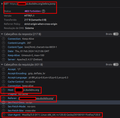
Changes on SOP and CORS on Firefox
I'm a cybersecurity professional and I'm researching about Same Origin Policy, Cross Origin Resource Sharing and how firefox deal with those things. I've find out that versions before 102.1.0esr, cross-origin script GET requests used to attach cookies (Image 1), but in newer versions, it's not happening (Image 2). I checked the release notes but didn't find nothing about this change.
I would like to learn more about what changed and how Firefox is dealing with cookies, SOP and CORS.
Thanks!
Toutes les réponses (2)
It may be due to bug 1802086.
whatwg/fetch#1544 changes the Fetch Standard to remove a web-developer-set Authorization header upon a cross-origin redirect.
According to https://wpt.fyi/results/fetch/api/credentials/authentication-redirection.any.html, all the web browsers already conforms with this spec change.


